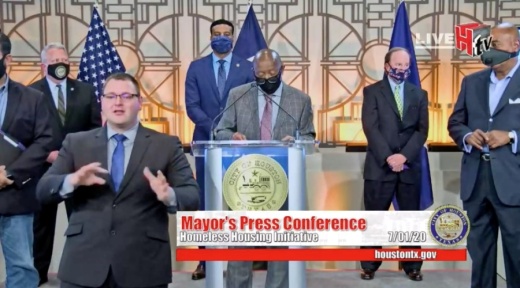Harris County is teaming up with the city of Houston and a group of local nonprofits on a mission to end chronic homelessness in the county over the next two years.
Harris County commissioners agreed June 30 to commit $18 million to a new program that will work to rapidly increase access to housing for as many as 5,000 homeless individuals. One day later, Houston Mayor Sylvester Turner announced that the city will commit another $40 million.
The effort will be carried out as part of the larger The Way Home initiative, a group of more than 100 partners formed in 2011 with the goal of ending homelessness in the cities of Houston and Pasadena as well as in Harris, Fort Bend and Montgomery counties.
Precinct 2 Commissioner Adrian Garcia, who first proposed a task force to look into the issue in 2019, said the funding commitment marks a historic moment in the history of Harris County.
"This is the first time Harris County has contributed significantly to this issue," Garcia said at the June 30 meeting. "The whole strategy across this particular initiative is specifically in the area of rapid rehousing. This will have, we believe, the most significant impact on the encampments that we see throughout the county."
The initiative is broken down into several different programs.
- Rapid rehousing: will provide rental assistance for 1,700 newly homeless people who do not require intensive case management
- "Bridge" to permanent supportive housing: will house 1,000 people—primarily unsheltered and those living in encampments—while they await PSH units
- Shelter diversion: will provide three months' rent to prevent people from entering the homeless system
- PSH homeless prevention: will provide ongoing rental assistance and wraparound services to 200 people who are at-risk of homelessness
On top of the $58 million from the city and county, another $6.5 million in funding will come from private donors. City and county funding will be reimbursed by federal dollars made available through the Coronavirus Aid, Relief and Economic Security Act.
The item passed with unanimous support from the Harris County Commissioners Court. Commissioner Rodney Ellis said it was a big and bold move, while Commissioner Jack Cagle described the plan as a "fiscally responsible way to reduce an ongoing problem."
The city and county will work closely with the Coalition for the Homeless on the initiative. Officials said they would adopt a strategy similar to the one implemented after Hurricane Harvey that, in part, involves paying landlords an incentive fee to put forth units that can be used to house individuals.
The urgency of addressing homelessness has been exacerbated by the coronavirus pandemic, which officials said has not had an immediate effect on homeless counts but could create a future crisis in homelessness if the county does not prepare in advance.
In a count of homeless individuals conducted by the coalition in late January, before the coronavirus pandemic hit Texas, a total of 2,202 sheltered and 1,551 unsheltered homeless people were recorded in Harris County. The coalition counted another 221 homeless individuals in Fort Bend and Montgomery counties, according to the 2020 report.
Marc Eichenbaum, special assistant to Houston Mayor Sylvester Turner on homeless initiatives, said teams are looking at statistics to get a better idea of how many people could become homeless as a result of COVID-19, but he said it is difficult to project at this point. When it comes to slowing the spread of the virus among the homeless, he said it is more crucial than ever to get people off the streets as quickly as possible.
Most of the 5,000 individuals will be housed in the first year of the program, Eichenbaum said.
"We have a very high-powered homeless system compared to the rest of country," Eichenbaum said at the June 30 meeting. "They just need resources, and they can take it from there and achieve major, major things."
Garcia and Eichenbaum both said the initiative would have long-term financial benefits. The taxpayer cost of dealing with an unsheltered homeless person in Harris County is about $41,000 per year on average, Garcia said. Putting people in housing reduces that cost to about $17,000 per year by reducing public money spent on health care, among other areas.
Although the initial infusion of money will be covered by the CARES Act, Ellis stressed that the county should be prepared to spend local money in the future to keep the program alive.
Mike Nichols, president and CEO of the Coalition for the Homeless, said rehousing efforts carried out by the coalition have about a 90% success rate, meaning people stayed out of hospitals and the criminal justice system and eventually moved toward independence. When the program is up and running, he said any homeless person who presents themselves will be able to be housed within 30 days.
"When we use this money and have this plan developed, we will functionally end chronic homelessness," Nichols said.





